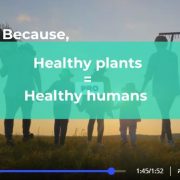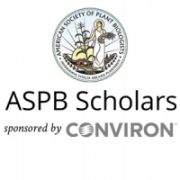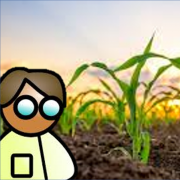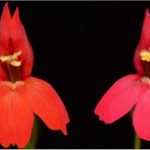Informational interview with Dr. Anoma Lokossou from Syngenta, Netherlands
Informational interview by Mathieu Ayenan, ASPB Conviron Scholar
Can you please introduce yourself?
 I am Anoma Lokossou. I hold a Master degree in Biotechnology and Bioengineering from Université de Toulouse in France and a Ph.D. in Plant Breeding from the University of Wageningen. For my Ph.D. I cloned resistance genes to Phytophthora infestans in potato. I did a six-month post-doc on identification of Phytophthora infestans effectors targets in Potato to get further insight into the resistance mechanism activated upon P.i. attack (https://www.researchgate.net/profile/Anoma_Lokossou ). I am currently a Genetic Project Lead at Syngenta working on lettuce and spinach, with a focus on disease resistance. In my current position, I work closely with phytopathologists, physiologists and plant breeders. I build upon discovery in plant biology to develop molecular markers and other tools that help breeders to accelerate development of improved crops varieties.
I am Anoma Lokossou. I hold a Master degree in Biotechnology and Bioengineering from Université de Toulouse in France and a Ph.D. in Plant Breeding from the University of Wageningen. For my Ph.D. I cloned resistance genes to Phytophthora infestans in potato. I did a six-month post-doc on identification of Phytophthora infestans effectors targets in Potato to get further insight into the resistance mechanism activated upon P.i. attack (https://www.researchgate.net/profile/Anoma_Lokossou ). I am currently a Genetic Project Lead at Syngenta working on lettuce and spinach, with a focus on disease resistance. In my current position, I work closely with phytopathologists, physiologists and plant breeders. I build upon discovery in plant biology to develop molecular markers and other tools that help breeders to accelerate development of improved crops varieties.
How did you become interested in plant science?
My interest in plant science dates back to my childhood. I used to have severe asthma while growing up in Lomé (Togo); all treatment at the hospital failed to cure my disease. I had to take many plant concoctions over recommendation of family friends. I then got interested in knowing what is actually in the plants and could treat ailments. My parents, however, wanted me to become a physician. At 17, I went to France to pursue my studies. I first enrolled for a BSc in biology but under the insistence of my parents, I left for medical school. Things did not work out as expected and I fell back on my first love, Biology. After a Bachelor Degree in Biology, the burning desire to identify the active ingredients contained in medicinal plants used in traditional medicine in Africa led me to enroll for a Master program in Biotechnology and Bioengineering at the University of Toulouse. I did not end up identifying active ingredients in plants but my asthma during my childhood definitely put me on the path of plant science.
How did you begin your career?
I really started my career after my Ph.D. I have always been interested in working in the seed industry. After my Ph.D. I applied for a position at Syngenta. However, I didn’t get a quick feedback from them and I accepted a Post-doc position at the department of plant breeding at Wageningen University where I continued working on resistance genes of potato against Phytophthora infestans. Initially planned for 2 years and half, I halted my Post-doc after 6 months as I finally got the job position at Syngenta which I joined in February 2011. My expertise in plant-disease interaction from my Ph.D. was important in getting my position, Genetic Project Lead Salad, at Syngenta.
Why did you choose industry over academia?
Interesting question. When I completed my Ph.D. and post doc, I had the opportunity to continue in academia. However, I felt I would not be able to make much impact (develop products that impact the lives of millions of people) in academia. In industry, I can see tangible results (products) from my research. Originally from Togo, I know how important improved crop seeds are to enhance peoples livelihood. I felt the best way to contribute to that is to be in the industry, especially the seed industry. As I said earlier, I joined the company in 2011 and in 2014, I had the opportunity to work on a project other than my core job. I chose to work on the subject: “how to improve the penetration of the West African market for vegetables”, so that farmers in this region can benefit from the latest available varieties. That’s the kind of impact I was looking for and I could easily do in the industry.
As a Genetic Project Lead, what are your main responsibilities?
As Genetic Project Lead, I am mainly responsible for development, validation and application of genetic technologies to speed up breeding and release of new crops varieties. I also collaborate with other departments (Bioinformatics, phytopathology, breeding, and other groups) within the company to make available and use of efficient information, protocols, tools, and methodologies for molecular breeding. Besides, I have to ensure my team members are giving their best by empowering and inspiring them. I spend a big part of my time with my team members to know their interest, to identify their strengths and weaknesses, and when needed, I help them with their personal development plan.
Why Syngenta?
My choice of Syngenta was driven by the work of Syngenta Foundation for Sustainable Agriculture (https://www.syngentafoundation.org/articles/news/good-idea-does-it-work ), which empowers smallholder farmers and improve their livelihood in developing countries. I knew I could indirectly contribute to the impacts of Syngenta Foundation by joining Syngenta.
What do you like most about your work?
Knowing that my effort will result in a product being cultivated by farmers and used by consumers gives me a high feeling of satisfaction. At Syngenta, the working environment enables me to keep my mind very sharp and to be scientifically at top. It puts me at the forefront of latest development in my field. The company offers a lot of resources including mentoring and tailored training for personal development.
What kinds of accomplishments tend to be valued and rewarded at your job?
Your reward often comes from outside of your job description. For instance, your abilities to set challenging, innovative, and measurable objectives are valued. The way you achieve the objectives is equally important. Plus, your abilities to interact with other, inspire them and their feedback on your work count as well.
At your position, you are involved in recruiting team members, what guides your choice of candidates?
It depends on the setting, but what cuts across is that the candidate has to have a sense of what is the business. If I am recruiting where there is no existing structure, I need someone who has a sound technical and analytical skill in agronomy or breeding. The soft skills that make the differences is the flexibility in adapting to different situations. I value humility. If you are technically excellent but arrogant, it will surely not be of help to you. When I am recruiting where a team is already in place, at the top of technical skills, I need someone who can easily fit in the team, and has excellent communication and analytical skills.
What skills are needed to hold this position?
There is no need to emphasize the importance of technical skills; you have to be scientifically at top in your field. For instance, know the latest development in gene editing, omics, genomic selection and how they can be harnessed for variety development. The science is evolving at a light speed; you should keep on learning. You need to be abreast of the development in the field. Collaboration with top scientists is key to have first-hand information. It is obvious you cannot be good at everything, that is why you need to be selective about where you need to put your effort in and be very good at it. Besides, this position involves working in a multiple disciplinary and multi-cultural environment, for this reason, you need to have excellent communication skills that enable you to efficiently convey your ideas within and across your field. Flexibility and your capacity to adapt to changes and analytical skills are equally important.
Thank you very much for your time.









